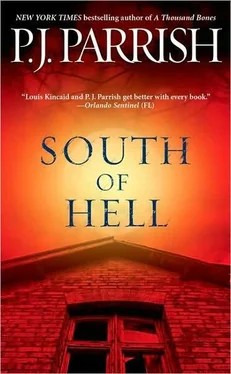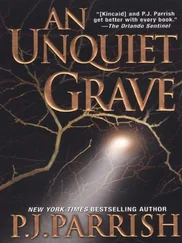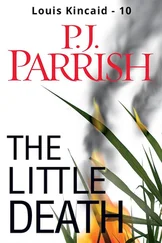P. Parrish - South Of Hell
Здесь есть возможность читать онлайн «P. Parrish - South Of Hell» весь текст электронной книги совершенно бесплатно (целиком полную версию без сокращений). В некоторых случаях можно слушать аудио, скачать через торрент в формате fb2 и присутствует краткое содержание. Жанр: Триллер, на английском языке. Описание произведения, (предисловие) а так же отзывы посетителей доступны на портале библиотеки ЛибКат.
- Название:South Of Hell
- Автор:
- Жанр:
- Год:неизвестен
- ISBN:нет данных
- Рейтинг книги:5 / 5. Голосов: 1
-
Избранное:Добавить в избранное
- Отзывы:
-
Ваша оценка:
- 100
- 1
- 2
- 3
- 4
- 5
South Of Hell: краткое содержание, описание и аннотация
Предлагаем к чтению аннотацию, описание, краткое содержание или предисловие (зависит от того, что написал сам автор книги «South Of Hell»). Если вы не нашли необходимую информацию о книге — напишите в комментариях, мы постараемся отыскать её.
South Of Hell — читать онлайн бесплатно полную книгу (весь текст) целиком
Ниже представлен текст книги, разбитый по страницам. Система сохранения места последней прочитанной страницы, позволяет с удобством читать онлайн бесплатно книгу «South Of Hell», без необходимости каждый раз заново искать на чём Вы остановились. Поставьте закладку, и сможете в любой момент перейти на страницу, на которой закончили чтение.
Интервал:
Закладка:
He hadn’t noticed the pattern before, but then there had been no reason to. Now, all the details registered: a large white plantation-style home, a white horse pulling a black carriage, tall-masted sailing ships. A couple — the man in a long black waistcoat and the woman with her hair up in bun and wearing a long yellow gown straight out of the mid-nineteenth century.
This had been Amy’s room. How many nights had she lain in here alone, staring at this wallpaper, absorbing its details?
Louis tore a piece of the peeling paper from the wall, folded it, and stuck it into his pocket. Back out in the narrow hallway, he paused. An open door caught his eye — another staircase.
The attic. He hadn’t bothered with it on his first visit. He climbed the creaking narrow stairway. The dim, low-ceilinged attic was crammed with junk: furniture, countless old boxes, stacks of picture frames, an old violin case, rusting tools, and, near the door, piles of yellowed newspapers, some reaching to his chest. He glanced at the top newspaper: HAUSFREUND UND POST, ANN ARBOR MICH. 1891.
There was so much junk — and so little light coming through the one small circular window — he could barely move. And the place gave off a foul feeling. It was nothing he could put a name to, but it was the same feeling he got being in the kitchen, like he had to get out and breathe fresh air. For a moment, he considered abandoning his search. But he knew if there was anything that could illuminate this house’s past, it would be found here.
He spotted an old rope hanging from the rafters. He went to it and fingered the frayed end, thinking of Amy’s memories of being tied up. But she always talked of being outside or in the barn.
He was about to give up when he spotted a large trunk. He opened it, but it appeared to be filled only with old clothes. Underneath the old lace and moth-eaten velvets, though, his hands closed around an old biscuit tin. It was filled with photographs, small, sepia-toned, and faded with age. There was no time to go through them now. He set the tin aside and dug further.
A Bible…
He pulled it out. It was a heavy old thing, its dark red leather scarred, its bindings eaten away by age and insects. He had seen one like it before, back in the Mississippi boarding house where he had briefly stayed while waiting for his mother to die. The woman who had rented him the room — Bessie, he could still see her face clearly — had brought the Bible out one night to show him her family tree because she had a notion that it would instill a sense of pride in his own roots. It hadn’t worked — that was a different life, and he had been a different, younger man then. But he had been intrigued by Bessie’s attachment to her past and her need to write it all down.
The Bible opened with a soft crack. And there it was, whole lives laid out on the frontispiece in a listing of births, deaths, and marriages.
Louis took the Bible over to the small window for more light. The names at the top said family record amos and phoebe brandt. Patting his jacket, he found his glasses and slipped them on. The listings began in 1800, and a quick calculation told him he was looking at Owen Brandt’s great-great-great-grandparents.
Family Record
Amos and Phoebe Brandt
Name
Place
Birth
Marriage
Death
Amos Brandt
Hell, Mich
1800
Phoebe Poole
1879
Phoebe Brandt
Hell, Mich
1802
Amos Brandt
1872
Ann Brandt
Hell, Mich
1829
Clay Stafford
1869
Lucinda Brandt
Hell, Mich
1830
Randolf Rawls
Zachary Stafford
Kalamazoo, Mich
1849
Linda Wigginton
Joseph Stafford
Kalamazoo, Mich
1853
Sharon Potts
Thomas Rawls
Kalamazoo, Mich
1853
Joanne Sinchuk
Caroline Rawls
Kalamazoo, Mich
1856
Jeremiah Healy
Quince Stafford
Flint, Mich
1868
Catherine Carper
This confirmed that the farm had been in the Brandt family for generations. And at least Louis had hard proof that the Amos of Amy’s memories was a real man and that his name had been written down in a Bible that Amy could have seen.
As Louis studied the names, he found himself trying to imagine what kind of man Amos Brandt had been. And even stranger, he was trying to imagine what Amos Brandt would feel seeing his farm in ruin and worse, knowing his family tree had produced such rotted stock as Owen.
He glanced at his watch. He had to get out of here before Brandt returned. He was about to close the Bible when a thought hit him.
He looked again at the names.
Damn. Amos and Phoebe had only two daughters, Ann and Lucinda. The daughters had married and taken their husbands’ names. So, how had the Brandt name survived five generations without sons? Who the hell had Owen Brandt descended from? Something wasn’t right.
There were two words scrawled under one of the death entries. The second word was cemetery; the other might have said brandt, but he couldn’t make it out.
He closed the Bible, took it and the tin of photographs, and climbed down out of the attic and went back to the kitchen. He retraced his steps through the cellar and closed the blue doors, pulling weeds over them.
Back in the Bronco, he tore a muddy, gravel-spewing path back to the Texaco station. No sign of the Gremlin, so he chanced a quick stop at the gas station, parking out of sight just in case.
Inside, a pimply-faced kid was tipped back in a chair behind the register reading a comic book. He looked up at Louis with eyes that said he didn’t get many black men in this part of his world.
“Hey, is there a cemetery around here?” Louis asked.
The kid frowned. “Well, there’s a big county one up near Pinckney.”
“No, I mean a small one, like just for one family.”
The kid shook his head. “Ain’t nothing buried around here.”
Louis thanked him and left. Back in the Bronco, as he waited for the heater to chase away the chill, he looked again at the Bible’s frontispiece.
Two things were gnawing at his brain. How had Owen Brandt come to inherit the farm and the Brandt name if Amos had no sons? And why had Amy screamed out Amos’s name in terror?
He stared at the name amos brandt at the top of the register. This was the man who would give him answers.
All he had to do was find him.
Chapter Twenty-three
Aphone call to the Livingston County records office had led Louis to a clerk who had patiently gone through the records but found nothing with the name Brandt in it. It didn’t even appear on the countywide survey of family plots the Daughters of the American Revolution had done back in the forties.
But the clerk had told Louis that her grandfather often talked about an abandoned cemetery somewhere out by Lethe Creek. She directed him to Talladay Trail, a dirt road that ran along Lethe Creek. The creek, Louis knew, was the northern border of the Brandt land.
The Bronco bounced along the rutted road, overgrown branches scraping the windows. Louis slowed to avoid a hole, and that was when he saw the small break in the trees. He stopped and peered out of the side window.
He thought he caught a glimmer of water through the brush. But no way could he get the Bronco down that road. He switched off the engine and got out.
Through the quiet, the trickle of water pricked his ears. He followed the sound through the brush and down a hill, emerging into a marshy slough.
Lethe Creek spilled out before him, its tea-colored water cutting a slow, broad swath through the cattails and sedge grasses before disappearing into a tunnel of black trees to the west.
Читать дальшеИнтервал:
Закладка:
Похожие книги на «South Of Hell»
Представляем Вашему вниманию похожие книги на «South Of Hell» списком для выбора. Мы отобрали схожую по названию и смыслу литературу в надежде предоставить читателям больше вариантов отыскать новые, интересные, ещё непрочитанные произведения.
Обсуждение, отзывы о книге «South Of Hell» и просто собственные мнения читателей. Оставьте ваши комментарии, напишите, что Вы думаете о произведении, его смысле или главных героях. Укажите что конкретно понравилось, а что нет, и почему Вы так считаете.












